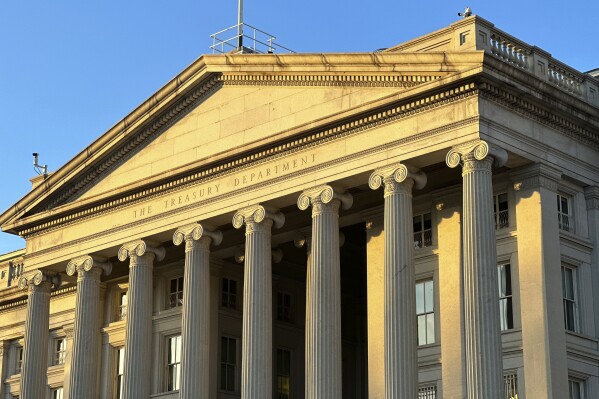Retail sales fall 0.8% in January from December as shoppers pause after strong holiday season
NEW YORK (AP) — Americans pulled back their spending more than expected in January after the traditional holiday season splurge.
Retail sales fell 0.8% in January from the strong pace in December when they rose a revised 0.4%, according to the Commerce Department’s report on Thursday. Excluding sales at auto dealerships and gas stations, sales were down 0.5%. The decline was bigger than the 0.10% drop that economists expected and marked the lowest monthly figure since March of last year.
Economists attributed part of the pullback to snowy weather conditions, but they also said that the slowdown shows shoppers may be finally buckling under higher interest rate and other financial hurdles and that the economic momentum from the end of 2023 could be starting to fade. Excluding sales of autos, gas, building materials, and restaurant meals, the so-called “control group” of sales — which is used to calculate economic growth —fell 0.4% in January. Economists were expecting an increase.
The retail sales report could offer positive news that the Federal Reserve could finally start to cut rates, bringing relief to shoppers and businesses seeking lower rates for borrowing.



“Real consumption appears to have declined in January and, even allowing for a recovery over February and March, growth will slow sharply in the first quarter,” wrote Andrew Hunter, deputy chief U.S. economist at Capital Economics, in a report. “The upshot is that Fed officials may not need to worry much longer about the possibility of continued economic resilience reigniting inflation.”
Despite higher borrowing costs and elevated prices, household spending continues to be fueled by a strong jobs market and rising wages.
There was another surprising burst of hiring to start off 2024 as employers added 353,000 jobs in January, more evidence that the highest interest rates in two decades, intended to slow the economy, have yet to take hold.
But the slowdown in spending in January was widespread as shoppers cut back their spending in nine of 13 categories.
Business at clothing and accessory stores was down 0.2%, while sales at health and personal care stores fell 1.1% Sales at building materials and garden suppliers fell 4.1%, reflecting bad weather conditions. Business at general merchandise stores was unchanged. Online sales fell 0.8%. Business at restaurants rose 0.7%
Consumer inflation in the United States cooled last month yet remained high and the U.S. reported this week that consumer price index rose 0.3% from December to January. Compared with a year ago, prices are up 3.1%.
That’s far below the 9.1% inflation peak in mid-2022, but solidly above the Federal Reserve’s 2% target level at a time when public frustration with inflation has become a pivotal issue in President Joe Biden’s bid for re-election.
Major retailers including Walmart and Macy’s are slated to report financial results for the fiscal fourth quarter, which includes the critical holiday period, in the next few weeks.
The government’s monthly retail sales report offers only a partial look at consumer spending; it doesn’t include many services, including health care, travel and hotel lodging.
—-
AP Economics Writer Chris Rugaber in Washington contributed to this report.
Disclaimer: The copyright of this article belongs to the original author. Reposting this article is solely for the purpose of information dissemination and does not constitute any investment advice. If there is any infringement, please contact us immediately. We will make corrections or deletions as necessary. Thank you.





